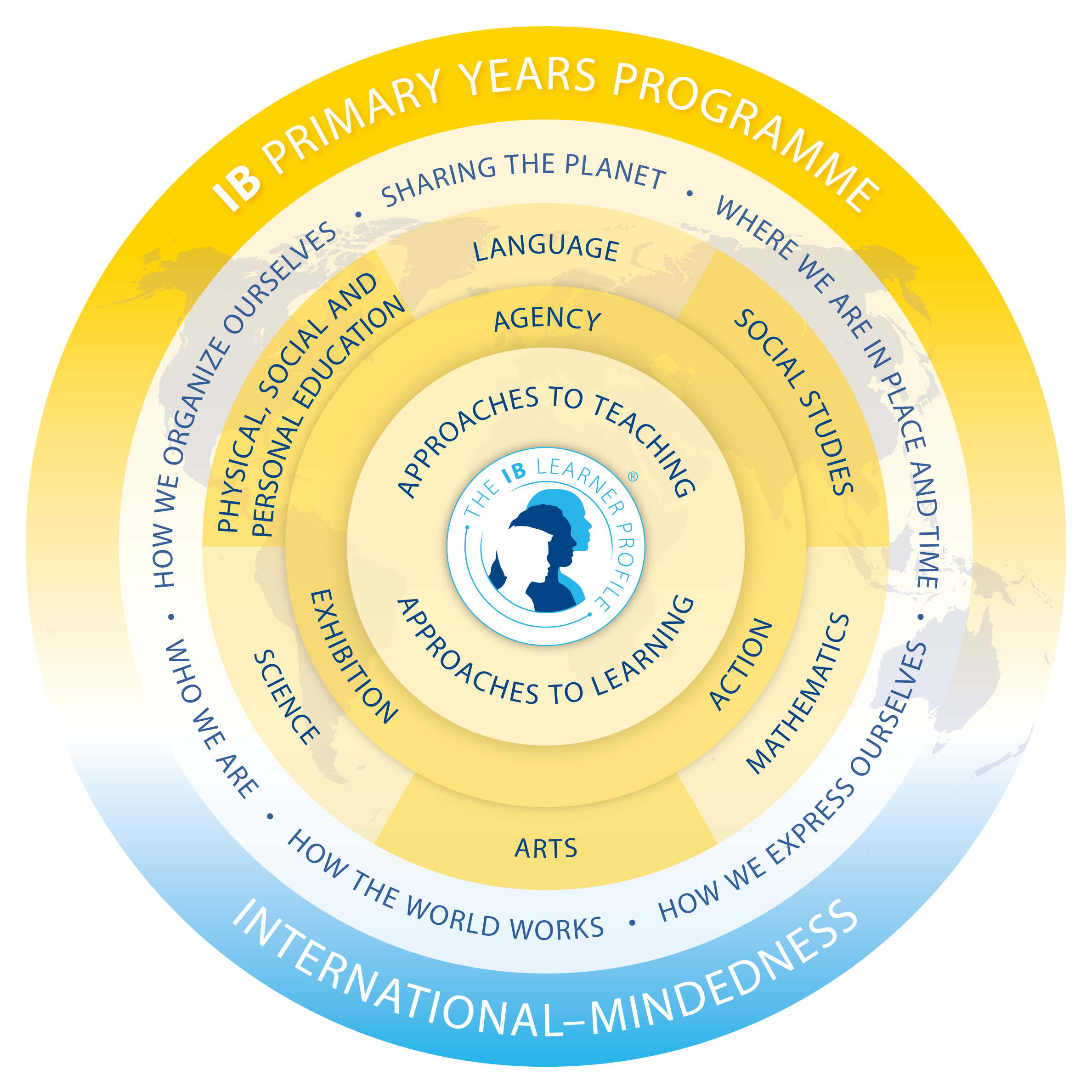Primary Years Programme

© International Baccalaureate Organization 2024
The IB Primary Years Programme (PYP) has become a world leader in future-focused education for children aged 3-12. The PYP nurtures and develops young students as caring, active participants in a lifelong journey of learning. By learning through inquiry and reflecting on their own learning, PYP students develop knowledge, conceptual understandings, skills and the attributes of the IB Learner profile to make a difference in their own lives, their communities, and beyond.
The IB learner profile in the PYP
The IB Learner Profile represents a broad range of human dispositions, capacities and traits that encompass intellectual, personal, emotional and social growth. All members of the learning community from the youngest learners to school leaders to parents, educators and beyond, have a responsibility to be guided by and demonstrate a commitment to the development of the IB learner profile attributes.
The learner profile requires IB learners to strive to become inquirers, knowledgeable, thinkers, communicators, principled, open-minded, caring, risk-takers, balanced and reflective.
To learn more about the IB Learner Profile, please visit the following link
The Primary Years Programme (PYP) offers a transdisciplinary, inquiry-based, concept-driven and student-centred education with responsible action at its core, enabling students to learn between, across and beyond traditional subject boundaries. Learning and teaching in the PYP are supported by a strong understanding of how students learn. The programme model is engaging, significant, challenging and relevant. PYP aims to develop students’ academic, social and emotional well-being, honouring the curiosity, voice, and contribution of the young learners.
6 transdisciplinary themes
In the PYP, students explore real-world problems by going beyond subject boundaries. The programme of inquiry is organised and framed by six transdisciplinary themes:
1. Who we are
2. Where we are in place and time
3. How we express ourselves
4. How the world works
5. How we organize ourselves
6. Sharing the planet
Information and communication technology (ICT) in the PYP
Through the IB curriculum, students solve authentic problems using modern technology tools. Technology supports all student inquiry, immersing students in the interplay between learning technology (tools), learning about technology (concepts), and learning through technology (aiding and extending learning).
Agency, Self-efficacy and Action in the PYP
Throughout the programme, the learner is an Agent for their own and others’ learning. They direct their learning with a strong sense of identity and self-belief, and in conjunction with others, build a sense of community and awareness of the opinions, values and needs of others. When teachers acknowledge learner agency and the importance of self-efficacy, students become partners in the learning process.
Self-efficacy influences the choices students are confident in making, which, in turn, influences the degree of ownership and impact they have in their lives. The stronger the sense of self-efficacy in students, the greater the likelihood that they will exercise agency. Students with a strong sense of self-efficacy are active in their own learning and take action in their learning community.
Through taking individual and collective Action, students come to understand the responsibilities associated with being internationally minded and appreciate the benefits of working with others for a shared purpose. Action, the core of student agency, is integral to the PYP learning process and to the programme’s overarching outcome of international mindedness.
The PYP exhibition
In the final year of the PYP, students take part in the PYP exhibition. The exhibition is an authentic process for students to explore, document and share their understanding of an issue or opportunity of personal significance. By emphasizing learner agency and inquiry-based learning, the PYP Exhibition equips students with essential skills and dispositions for lifelong learning, preparing them to become responsible, inquiring, and knowledgeable global citizens.
Students are guided to formulate their own questions, design their inquiries, and actively seek information from various sources. This inquiry-based approach fosters curiosity, promotes independent thinking, and encourages students to make connections between different areas of knowledge.
Throughout the Exhibition process, students engage in collaborative learning, sharing their findings, and seeking feedback from peers, teachers, and mentors. This collaborative aspect nurtures learner agency by providing opportunities for students to take responsibility for their learning, make informed decisions, and contribute to the learning community.
The transdisciplinary model of the PYP underpins the three pillars of school life: The learner, Learning and teaching, and The learning community.
The learner
The PYP curriculum framework begins with the premise that PYP students are agents of their own learning and partners in the learning process. Understanding how students learn is foundational to the inquiry-based and concept-driven transdisciplinary model of learning and teaching. The PYP curriculum recognizes learners’ innate potential to inquire, question, wonder and theorize about themselves, others, and the world around them.
Learning and Teaching
The Primary Years Programme (PYP) ensures that learning is engaging, relevant, challenging and significant. The PYP curriculum highlights important shared features of an IB education.
The learning community
The IB unites a worldwide community of learners who believe that education can help to connect and build a better, more peaceful world. The IB learning community views the world as the broadest context for learning, where everyone involved in the life of the school is recognized: students and their families, all school staff members, other important adults in the students’ lives and the community at large.
The PYP encourages critical and creative thinking through continual inquiry, action and reflection, which places students at the heart of learning. The Primary Years Programme (PYP) supports children to:
1. develop knowledge, conceptual understandings and approaches to learning
2. become internationally-minded individuals
3. develop the attributes of the IB learner profile.
PYP Exhibition
PYP Exhibition encourages students to take action and apply their knowledge and understanding to address real-world issues or create innovative solutions.

